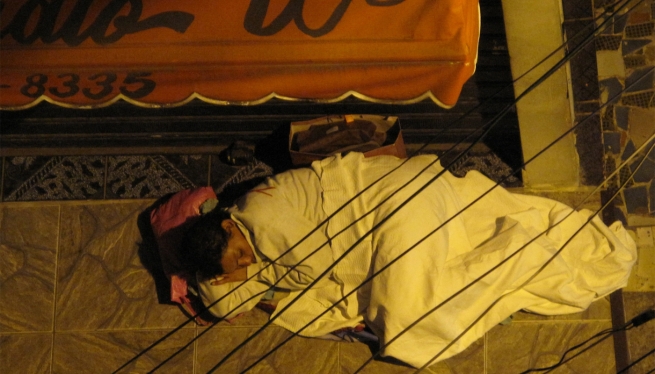BRAZIL: Salesian Missionaries Focus on Legal Protections for Street Children

(MissionNewswire) The Salesian-run Jugend Eine Welt – Don Bosco Aktion Austria has raised concerns over the high numbers of street children in Brazil, particularly the city of Rio de Janeiro. One of the organizations primary concerns is the treatment of street children who end up in juvenile detention centers and jail instead of appropriate programs that provide supports and education to these youth in need. More than 18.000 young people were held in the severely overcrowded juvenile detention facilities in 2015.
Salesian missionaries living and working in Brazil note that many street children were removed from the streets in advance of the Summer 2016 Olympics but that during normal times the city of Rio de Janeiro is home to more than 5,500 street children while nationwide it is close to 24,000. In many cases, street children are treated like criminals and detained without reasonable suspicion or legal protection. In the past these youth were held special institutions for children or juvenile detention centers as long as they were under 18. But Salesian missionaries fear this could change in future, making things even worse than they are now.
Citing Salesian Brother Raymundo Rabelo de Mesquita, a Brazilian expert for children’s rights who regularly visits young people detained in juvenile detention centers, the Salesian organization Jugend Eine Welt expressed concern that the Brazilian National Congress has again discussed a proposal to lower the age of criminal responsibility from 18 to 16 recently.
“This would only combat symptoms and punish young people who are without any perspectives in life. Most of them only committed crimes to survive,” says Fr. Mesquita. “We need more schools here, not more prisons.”
In 2015, Salesian missionaries also addressed an open letter to members of Brazilian parliament, appealing to them to defend children’s rights as enshrined in the country’s constitution and to reject the proposed lowering of the age of criminal responsibility. Hundreds of students in several Brazilian cities also supported these efforts standing with the young delinquents and protested against the proposed bill.
Jugend Eine Welt has welcomed the new Brazilian campaign “Respect Protect Ensure – Everyone together for the rights of children and adolescents” which was organized during the Olympic Games and will hopefully continue afterward. With the help of more than 100 volunteers the campaign is working to educate Brazilians and tourists about the most frequent violations of the rights of children and adolescent in the country including violations of the rights of street children.
“The campaign is also part of Projeto Rio 2016, which is a continuation of an initiative that started in advance of World Cup 2014 focused on the issue of sexual exploitation of children,” adds Fr. Mesquita.
Salesian missionaries provide education, workforce development and social services across Brazil and are focused on helping poor youth, including street children, to have their basic needs met and gain an education to have the employment and life skills to break the cycle of poverty and live productive lives.
Brazil has one of the strongest economies in Latin America and is an important agricultural and industrial power in the region. Just over 15 percent of Brazilians live in poverty, with the majority living in the rural northeast of the country, according to the World Bank. While Brazil is making positive changes, there are still large gaps between the poor and the rich and issues of income inequality and social exclusion remain at the root of those in poverty.
Inequalities also exist in access to education and educational efficiency. These inequalities are greatest for children and youth who are poor, live in rural areas or who have an incomplete compulsory education. Salesians working with poor youth and their families in Brazil develop programs and provide youth opportunities for furthering their education and skills.
###
Sources:
ANS – Brazil – Olympics Games: Street children need help, not prisons
World Bank – Brazil
Salesian Missions – Brazil




